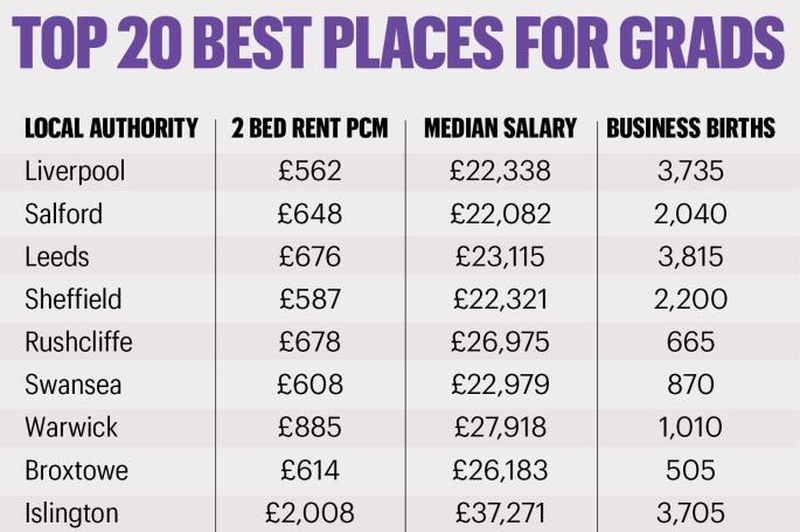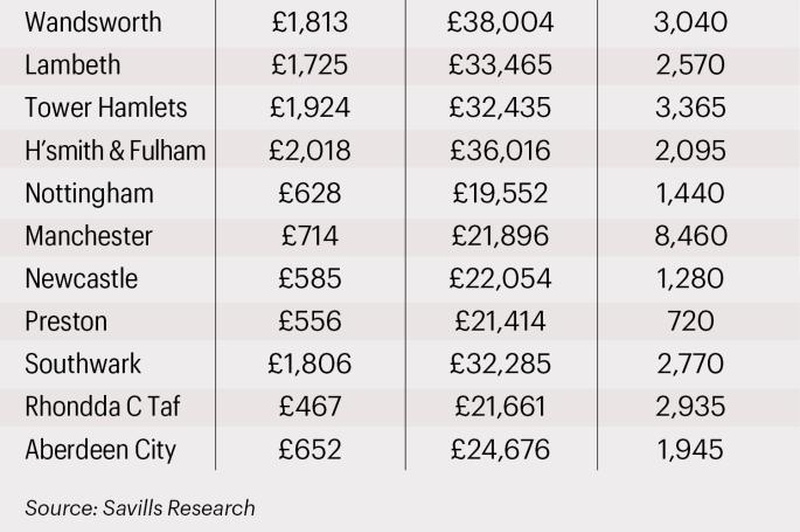Liverpool, Salford and Leeds are top for life after university
An article in The Sunday Times revealed that the top three cities for graduates are all in the north. Liverpool, Salford and Leeds came top of the list of those places where students will stick around long after they have shed their cap and gown.
Reasonable rents, quality of life and the opportunity to build a future were all key elements in the cities’ success.
Liverpool, Salford and Leeds all shone because they balance affordability with opportunity and a great lifestyle
Many young people will be thinking about the future this month as A-level results land. But the article suggest that they should be planning even further ahead to what life will be like after they graduate.


Savills Research considered the average graduate wage in a city and then compared it to the amount shelled out on rent, traditionally a graduate’s biggest expense. It also looked at the average house prices to reflect how easy it might be for a graduate to commit to buying their first home as well as considering factors such as average age (presuming that all graduates are bright young things who want to hang out with other bright young things) and ‘business births’ which is meant to represent how easy it is to launch a new business, a key ambition for many young graduates.
The study is more that just passing interest piece to those about to embark on student life. The Graduate Retention Rate, as the figure which represents the amount of students that stay on in the city that educated them is known, is considered to be a key economic indicator.

Liverpool, Salford and Leeds all shone because they balance affordability with opportunity and a great lifestyle, something other destinations could not compete with.
London is traditionally thought of as a destination for graduates, but the higher wages paid in the city are cancelled out by the increasing cost of living. According to Lawrence Bowles, research analyst for Savills:
“New graduates will inevitably compare salaries with their friends and watch with envy as some — particularly those who enrol in London graduate schemes — appear to earn eye-watering sums within a year or two of graduating, but our analysis shows that salary is not the sole indicator of quality of life. Grads are likely to have more cash left over after paying the rent in Liverpool than in Lambeth, and can afford to buy a home sooner.”

According to the study, on average, graduates in the winning city Liverpool will pay £562 a month to rent a two-bedroom home, spending 30% of their earnings, whereas as Islington – considered the best ward in London for grads – would cost £2,008 in rent every month, which equates to 65% of a new graduate’s salary.
While the Savills’ research focuses on tangibles such as housing and career prospects, it’s clear there is more to transitioning from student life to something (slightly) more grown up. Salford University, for one, seems to excel at embedding students within the fabric of the city, often in creative ways. For example, artworks by Salford students, tutors and alumni are currently being showcased in an exhibition commemorating the Peterloo Massacre at the People’s History Museum.
Another creative method of getting students to stick around long after they have given up beer pong is shown at Leeds Arts University. Graduates from the past five years can apply to join the Creatives in Residence scheme to complete a three-month residency, which includes the use facilities at the University and access to a support network. Another scheme sees local co-working spaces offer recent grads six months of studio space to help them get on their feet as they launch new businesses or establish themselves of freelancers, with eight hours of business mentoring thrown in, all of which makes the transition from student to self-sufficient that bit easier.

The entrepreneurial spirit fostered at the top cities is showcased by recent Salford graduate Melissa Ahmed, who gained an MRes in Mechanical and Aeronautical Engineering, her second degree from Salford (in 2016 she gained a 1st class degree in Aeronautical Engineering). Melissa and her mum (also a Salford alumna who graduated in information technology) set up Techwuman, an engineering consultancy company providing a range of engineering solutions, with a focus on promoting women in science and engineering. Melissa was selected by the Women’s Engineering Society as one of twenty celebrated female engineers to be profiled as part of the society’s centenary celebrations.
Melissa said: “It was amazing to have graduated from Salford, I have loved my time there. My qualifications have given me a great foundation to build upon, inspiring me to set up my own business and drive it forward.”

And of course the social life in all three cities has an enviable reputation. Excellent museums, cafes and bars as well as sports facilities and relatively easy access to the countryside means graduates can enjoy some well-earned leisure time.
This is all great news for students as they plan the rest of their lives, but why should the rest of us care? An inflow of students brings benefits to the local economy as they spend money on rent, food and, of course, socialising. But, according to think tank Centre of Cities, the extent to which cities can attract and retain skilled graduates will have a bigger impact on their economic performance.

According to a 2016 report: “If a city wants to attract and retain a greater number of graduates, then it needs to focus on wider economic growth and job creation policies that support the creation of more jobs, and particularly high-skilled knowledge jobs, rather than focus on policies that are specifically targeted at graduate attraction and retention. Ultimately, this comes down to strengthening the local economy, by investing in transport, housing and supporting high-knowledge businesses.
“They also need to prioritise developing more home-grown talent in their cities, by improving skills at all levels – from early years to GCSE attainment, further education and technical qualifications – which will be critical in increase the supply of home-grown high-skilled workers.”














